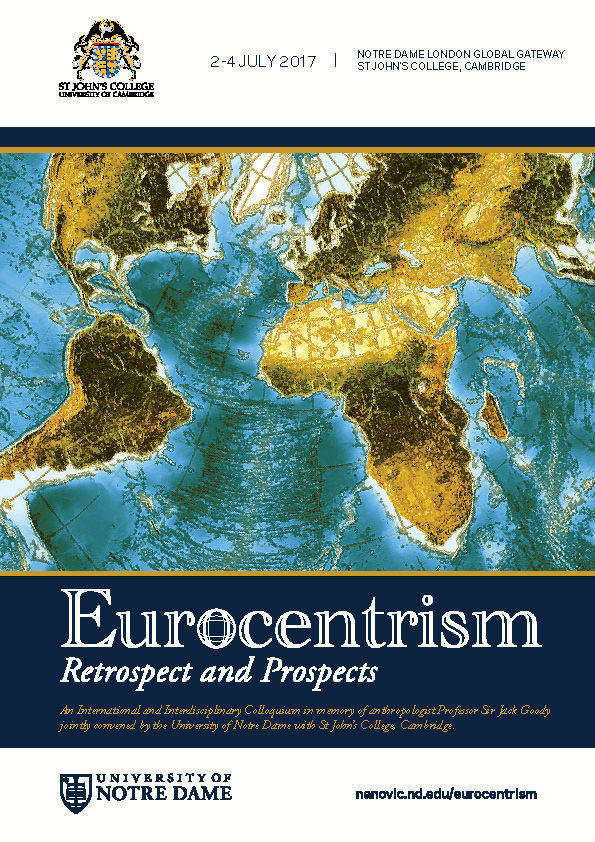
Download the Flyer
Download the Schedule
EUROCENTRISM: Retrospect and Prospects: An International and Interdisciplinary Colloquium, convened jointly by the Nanovic Institute for European Studies at the University of Notre Dame and St John’s College, Cambridge, in Memory of anthropologist Professor Sir Jack Goody, will take place in multiple locations in England on July 2-4, 2017.
Eurocentrism describes a tendency to focus on European culture or history to the exclusion of other areas of the world, particularly when the tendency comes from a disposition that regards European culture as preeminent among world cultures.
In historical writing, eurocentrism itself has a history. From the 1960s to the 1980s, and for a variety of reasons, attempts to narrate the history of the world emphasized the shaping role of European and North American influences. But by then, pressure had already been mounting to erode the historical consensus that made the 'West' the main focus of study and Western hegemony the unifying principle of world history. Some of the pressure came from recent scholarship, some from the influence of disciplines (including, and especially, anthropology and ecology) that encouraged scholars to treat the world as a whole. Other pressures came from the context of crumbling colonialism and accelerating globalization.
Jack Goody’s first book-length intervention in this debate, The East in the West (1996), was a key moment in the battle between assailants and defenders of the theme of Western dominance as central to an understanding of the history of the world. The Great Divergence (2000) by Kenneth Pomeranz, has come to represent, with some modifications, a consensus among historians, from which the main dissenters have been economists and political scientists.
Therefore, historians are now in a position to assess the past, present, and future of "eurocentrism" as a historiographical concern. Questions that now arise include:
Why and how did Eurocentrism become prevalent?
What undid its prevalence? What was Goody´s role in its undoing?
What has replaced it?
What, if anything, should be salvaged from it?
Panelists
- Aziz Al-Azmeh, Central European University
- Maurizio Albahari, University of Notre Dame
- James Belich, Balliol College, University of Oxford
- Paolo Luca Bernardini, University of Insubria
- Francisco Bethencourt, King´s College London
- Philip Bobbitt, Columbia University
- Peter Burke, University of Cambridge, Emeritus
- David Christian, Macquarie University
- H. Floris Cohen, Utrecht University
- Felipe Fernández-Armesto, University of Notre Dame
- Jack Goldstone, George Mason University
- David Graeber, London School of Economics
- Chris Hann, Max Planck Institute for Social Anthropology
- Keith Hart, University of Pretoria
- Elisabeth Köll, University of Notre Dame
- John McNeill, Georgetown University
- Ian Morris, Stanford University
- Patrick O’Brien, London School of Economics
- Göran Therborn, University of Cambridge, Emeritus
- Julia Adeney Thomas, University of Notre Dame
- Kerry Ward, Rice University
- Merry Wiesner-Hanks, University of Wisconsin-Milwaukee
- R. Bin Wong, UCLA
- Robert J.C. Young, NYU Abu Dhabi
Schedule
Panels are open subject to registration (required).
Sunday, July 2 - Notre Dame London Global Gateway
1-4 Suffolk Street, London, UK SW1Y 4HG
08:30 - 10:30 PANEL 1: Origins, Ascent, and Institutionalization of Eurocentrism
11:00 - 13:00 PANEL 2: The View from the West
14:00 - 15:30 PANEL 3: The View from the East
16:00 - 18:00 PANEL 4: Eurocentrism: Critics and Critiques
Monday, July 3 - Notre Dame London Global Gateway
1-4 Suffolk Street, London, UK SW1Y 4HG
08:30 - 10:00 PANEL 5: Interdisciplinary Perspectives on Jack Goody’s Work
10:30 - 12:00 PANEL 6: The Eurocentric Consensus?
Monday, July 3 - St John’s College, Divinity School, Lightfoot Room
17:30 - 19:00 PANEL 7: The Debate of the 1990s
Tuesday, July 4 - St John’s College, Divinity School, Lightfoot Room
08:30 - 10:30 PANEL 8: Towards a New Consensus? "Big" and "Deep" History
Sponsors
University of Notre Dame and St John's College, Cambridge
Including
The Nanovic Institute for European Studies, Keough School of Global Affairs
The Henkels Lecture Series from the Institute for Scholarship in the Liberal Arts, College of Arts and Letters
The Departments of History and Anthropology, College of Arts and Letters
Organizers
Felipe Fernández-Armesto
William P. Reynolds Professor of History
Nanovic Institute Faculty Fellow
University of Notre Dame
Philip Bobbitt
Herbert Wechsler Professor of Federal Jurisprudence
Columbia University
Peter Burke
Emeritus Professor of Cultural History
Emmanuel College
University of Cambridge